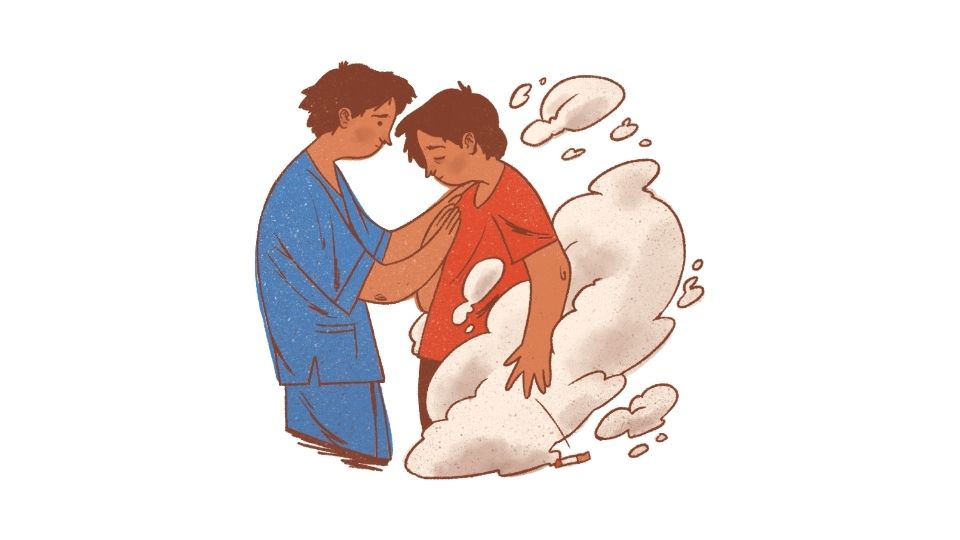What Is CNS Depression? (Causes & Symptoms)

Your brain on pause: understanding CNS depression and why it matters
Ever been so relaxed that even breathing felt like work? That’s a tiny taste of what happens during central nervous system (CNS) depression – when your brain and spinal cord essentially slow waaaaay down.
While this slowing can be therapeutic in small doses (hello, anxiety meds!), too much can be dangerous or even deadly. Let’s dive into what happens when your body’s command center decides to take an unauthorized break.
What is CNS Depression?
CNS depression happens when your brain and spinal cord functions significantly slow down. This isn’t just about feeling sleepy – it can affect critical bodily functions like breathing and heart rate.
Think of your CNS as your body’s CEO and IT department combined. When it’s depressed, all communications slow down and essential operations start failing.
The symptoms range from mild (feeling a bit drowsy) to severe (unconsciousness or even death). What makes it particularly dangerous is how it affects both voluntary functions (like walking or talking) and involuntary processes (like breathing or heart rate) that keep you alive.
What Causes CNS Depression?

Drugs That Slow Your Brain
The most common culprits behind CNS depression are (surprise!) CNS depressant drugs:
Opioids: Medications like morphine, oxycodone, and fentanyl that treat pain can dramatically slow brain activity. They’re the leading cause of fatal overdoses because they can make you literally forget to breathe.
Benzodiazepines: “Benzos” like Xanax and Valium are prescribed for anxiety and sleep issues. They enhance the effects of a brain chemical called GABA that puts the brakes on brain activity.
Barbiturates: Older medications that also affect GABA. They’re rarely prescribed nowadays because their therapeutic dose is dangerously close to their toxic dose.
Alcohol: Yes, your favorite happy hour beverage is actually a powerful CNS depressant! This is why mixing booze with other depressants is so dangerous.
Sleep medications and anesthetics: These are designed to intentionally depress your CNS to help you sleep or undergo surgery.
Beyond Drugs
CNS depression isn’t always drug-related. Other causes include:
Metabolic issues: Severe low blood sugar deprives your brain of essential fuel.
Toxins and poisons: Certain environmental toxins can slow brain function.
Medical conditions: Some infections and neurological diseases can impair CNS function.
How CNS Depression Works

Most CNS depressants work by enhancing the effects of GABA, the main “slow down” chemical in your brain.
GABA is like your brain’s brake pedal. When CNS depressants hit your system, they essentially stomp on that brake pedal, making neural messages transmit more slowly throughout your brain and spinal cord.
At low doses, this can be therapeutic – reducing anxiety or helping with sleep. At higher doses, it can impair vital functions like breathing.
Signs and Symptoms
Mild CNS Depression
- Feeling relaxed or sleepy
- Slight difficulty coordinating movements
- Slurred speech
- Mild cognitive impairment
- Decreased anxiety
Moderate CNS Depression
- Poor judgment (the “hold my beer” phase)
- Confusion
- Lethargy
- Significant coordination problems
- Notably slower breathing and heart rate
Severe CNS Depression
- Stupor or unconsciousness
- Dangerously slow or irregular breathing
- Potential respiratory arrest
- Possibly death if untreated
Red flags to watch for include excessive drowsiness that’s hard to shake off, breathing less than 12 times per minute, and bluish lips or fingernails (signaling low oxygen).
Who’s at Risk?

Some people are more likely to experience severe CNS depression:
Cocktail creators: People who mix multiple CNS depressants (like taking benzos with alcohol) face exponentially higher risks.
Tolerance builders: Chronic users may need higher doses to feel effects, increasing overdose risk.
First-timers: Opioid-naïve individuals can experience severe depression at doses that wouldn’t affect regular users.
Health-compromised: People with existing respiratory or neurological conditions face greater dangers.
Size matters: Smaller people generally need smaller doses to achieve the same effect.
Diagnosis and Treatment
How It’s Diagnosed
Doctors diagnose CNS depression primarily based on:
- Symptoms
- Medical history
- Drug screening tests
- Physical examination
In emergency settings, they’ll monitor vital signs closely and may perform toxicology screenings to identify what substances are involved.
Treatment Approaches
Treatment depends on severity and cause:
Supportive care: Ensuring clear airways and adequate breathing is priority #1. In severe cases, patients may need mechanical ventilation.
Antidotes: For opioid overdoses, naloxone (Narcan) acts like magic, rapidly reversing effects. For benzodiazepines, flumazenil can help, but it’s used cautiously.
Addressing underlying causes: If the depression stems from low blood sugar or other metabolic issues, these need correction.
Long-term management: For those with substance use disorders, comprehensive treatment is essential to prevent recurrence.
Outlook and Prevention

Most people recover fully from CNS depression with prompt medical intervention. However, if oxygen to the brain is compromised for too long, permanent damage can occur.
The best approach is prevention:
- Never mix CNS depressants
- Take medications exactly as prescribed
- Store medications safely away from children
- Learn to recognize early warning signs
- Don’t be afraid to call 911 if someone shows symptoms
CNS depression is entirely preventable, yet it claims thousands of lives annually – especially through opioid overdoses. Understanding these risks isn’t about fear-mongering but about empowerment.
Remember: your central nervous system runs everything from your heartbeat to your deepest thoughts. Keeping it functioning properly isn’t just about avoiding intoxication – it’s about staying alive.

